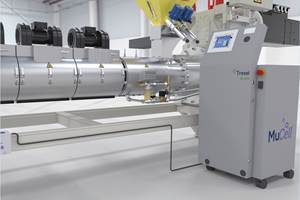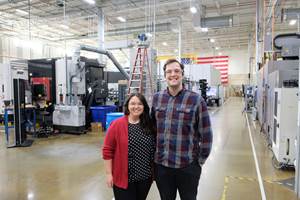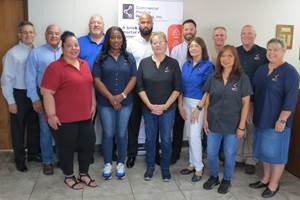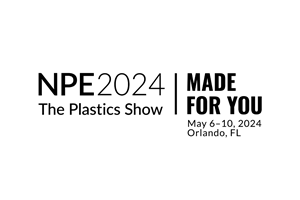Equipment Supplier Sees Demand for Circular Plastics Gathering Momentum
VDMA interviewed Martina Schmidt, head of recycling 大象传媒 unit at Vecoplan AG
is a supplier of industrial shredders and material handling equipment. The company’s US subsidiary is Vecoplan LLC. Plastics Europe Deutschland is the German division of the European plastics trade organization. As part of a series of interviews leading up to the K Show, (the German mechanical engineering trade association) spoke with its head of recycling 大象传媒, Martina Schmidt.
Ms. Schmidt spoke of the increased demand for recycled materials seen by Vecoplan customers, as well as the challenge of the shortfall of available recyclates. Schmidt described how recyclers are dealing with the challenges, and the potential for circularity to reduce environmental impact and improve the public image of plastics. The full text of the interview is included below.
VDMA: Ms. Schmidt, is the circular economy gaining momentum?
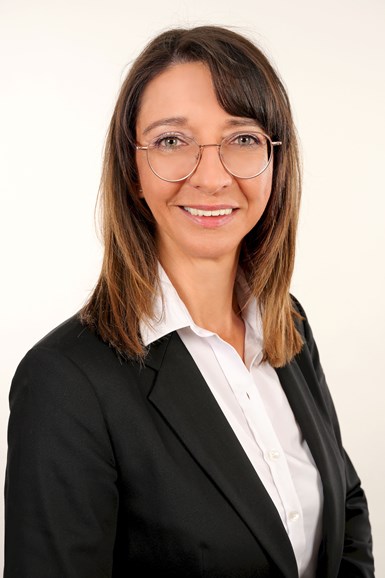
Martina Schmidt, head of recycling 大象传媒 unit at Vecoplan. Photo: Vecoplan AG
Schmidt: Yes, this great collaborative project has picked up enormous pace. The circular economy is now perceived very differently from just a few years ago. Everyone has understood that it's not just about functional waste management, but that all players in the market need to take part. This begins with product design, continues with politics (keyword: recycling quota), and finishes with the end consumer. Today, people are aware that the entire value chain must take action if we are to fight climate change and protect the environment.
VDMA: From which sector is Vecoplan seeing this additional, awareness-driven demand?
Schmidt: The demand is all across the board. It is not limited to certain sectors, because the entire plastics industry is undergoing changes. The main impetus stems from the recycling rate. The plastics industry has to come to terms with the fact that, in future, the product that is launched onto the market will contain recyclate as well as being recyclable itself. This development is being driven from both sides: both the producer and the customer are now looking for recycling concepts. The trend towards individual cycles will change everything in a sustainable manner.
VDMA: What are the consequences?
Schmidt: The demand is high, but there are not enough recyclates to meet those demands. The situation is currently being exacerbated by the fact that large corporations are creating these closed loops themselves. They then know the products that are in the loop, they know the manufacturing process, and the remanufacturing process. They know how the product comes back from the customer and how they can recycle it within their own loop. So, a large amount of potential recyclate does not reach the market.
VDMA: How can you counteract this?
Schmidt: Our customers are experiencing shortages of materials and rising prices. As an alternative, they are looking for other material streams of the same material that are also recyclable. In the polyolefin sector for example, these are big bags, filaments, yarns, non-wovens. These materials are available in sufficient quantities, but until now there has been no need to focus on them. This raises the question of where these material streams come from, what their mechanical and thermal characteristics are, and what process must be set up to recycle them. Through our decades of experience and expertise, we are capable of fully supporting our customers in this field.
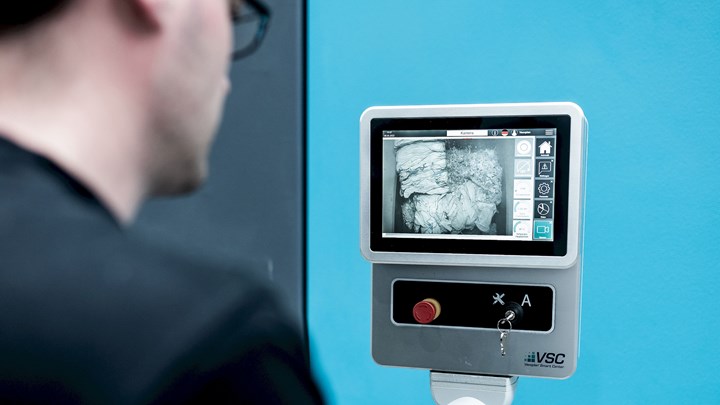
Vecoplan’s smart center displays camera feed from inside the machine.
Photo Credit: Vecoplan AG
VDMA: Can post-consumer plastics also be used to produce high-quality recyclates?
Schmidt: Basically, the answer is yes. The question is: how intensively would I want to do it, and what are my expectations of the end product? For example, I make a distinction between whether the packaging is produced for the food sector or for goods for everyday use.
VDMA: What part of the plastic material has already been tapped and how great is the potential?
Schmidt: The share of established cycles, and quantities that are processed in them is absolutely small compared to the quantities of materials that enter the market and are not yet recycled. The potential for recycling is quite considerable.
VDMA: What is Vecoplan’s response to changing customer requirements?
Schmidt: As in the other 大象传媒 areas at Vecoplan, the team in our 大象传媒 area consists of the highest-level specialists, which include plastics and application engineers, mechanical engineers, sales professionals, and project managers. It’s not solely a great deal of technical know-how that we collate within the 大象传媒 unit, but also extensive personal experience. In close cooperation with our customers, we offer the possibility of running test series with customer material and coordinating individual concepts in our technology center. For us as a machine and plant manufacturer, the circular economy is a great opportunity for actively shaping change.
VDMA: Will a well-functioning circular economy lead to a better image for plastic?
Schmidt: That will certainly be the case. Plastic does not deserve its bad image. It makes an important contribution to climate protection. A study by Fraunhofer Institute UMSICHT concluded that replacing virgin granulate with recycled material in packaging will reduce climate-damaging greenhouse gases by up to 60 percent. We should learn to make use of the advantages of plastic and, on the other hand, ensure that it does not end up in the environment. The circular economy will contribute significantly towards achieving this.
Related Content
Foam-Core Multilayer Blow Molding: How It’s Done
Learn here how to take advantage of new lightweighting and recycle utilization opportunities in consumer packaging, thanks to a collaboration of leaders in microcellular foaming and multilayer head design.
Read MoreScaling Up Sustainable Solutions for Fiber Reinforced Composite Materials
Oak Ridge National Laboratory's Sustainable Manufacturing Technologies Group helps industrial partners tackle the sustainability challenges presented by fiber-reinforced composite materials.
Read MoreInside the Florida Recycler Taking on NPE’s 100% Scrap Reuse Goal
Hundreds of tons of demonstration products will be created this week. Commercial Plastics Recycling is striving to recycle ALL of it.
Read MoreProcessing Megatrends Drive New Product Developments at NPE2024
It’s all about sustainability and the circular economy, and it will be on display in Orlando across all the major processes. But there will be plenty to see in automation, AI and machine learning as well.
Read MoreRead Next
See Recyclers Close the Loop on Trade Show Production Scrap at NPE2024
A collaboration between show organizer PLASTICS, recycler CPR and size reduction experts WEIMA and Conair recovered and recycled all production scrap at NPE2024.
Read MoreMaking the Circular Economy a Reality
Driven by brand owner demands and new worldwide legislation, the entire supply chain is working toward the shift to circularity, with some evidence the circular economy has already begun.
Read More





